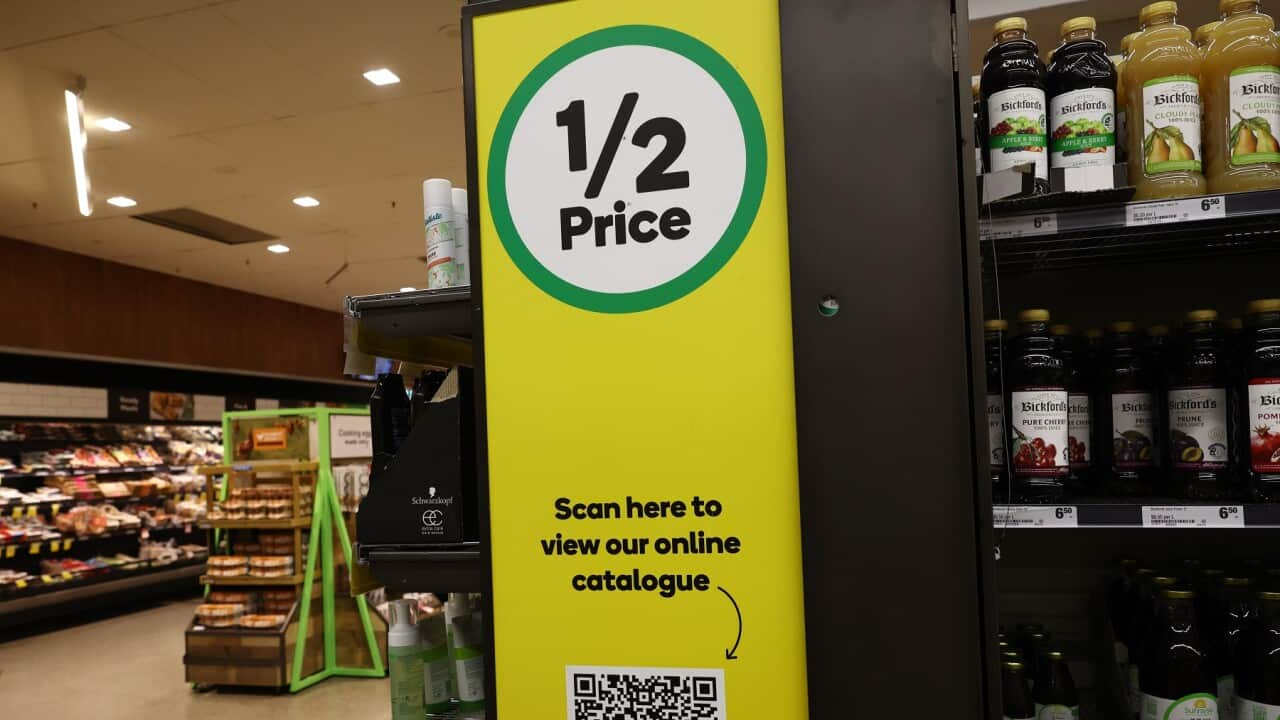TRANSCRIPT
Big red and yellow stickers... luring customers in with the promise of grocery discounts.
But are the supermarket giants advertising a real drop in prices?
That's what the ACCC will be unpacking in court, following a social media-led outcry.
Gina Cass-Gottlieb is Chairperson of the Australian Competition and Consumer Commission.
“We allege that Woolworths and Coles offered the products at regular long-term prices for six months or more, then increased the price for a short period before placing the products on the Woolworths prices dropped promotion or the Coles down down promotion at prices higher than, or the same as the prior regular price.”
Coles and Woolworths are alleged to have broken Australian consumer law, with their heavily marketed discounts on hundreds of popular products across a a 15 and 20 month period respectively.
They were mostly packaged products - but the Australian Competition Consumer Commission allege some refrigerated products, including dairy products, were included.
One example they cite - a sale by Woolworths of Oreo family biscuits initially at a price of $3.50 for nearly two years, then an increase in price to $5 for a 22 day period, and then the price moving to a $4.50 price when it's put on the prices dropped campaign - ultimately, a 29% increase in cost compared to the prior regular price.
And for Coles - the price of a packet of lemon Strepsils was raised from $5.50 to $7, before again dropping the price to $6.
The ACCC says these tactics have led to millions of dollars in revenue for the supermarkets.
It was the very consumers affected who brought to light the issue - like these consumers on TikTok drawing attention to what they infer are misleading specials.
TIKTOK 1: "Coles and Woolworths pricing is fascinating, and I've got a really great example here. So we have a product that was consistently $4.50 and would go on sale at half price down to $2.25, but we see it jump up to $7, and now when it goes on sale for half price, it's actually $3,50."
TIKTOK 2: "So is that Woolworths was $3 now, two 40. I bet you any money is $2.40 from the start. Bingo, you No, that's like all of them.”
The ACCC's Ms Cass-Gottlieb explains how consumers raised the issue.
“We first identified this conduct because of contact from consumers. We then tracked social media and saw on X, Reddit and TikTok that hundreds of consumers were reporting prices that they did not consider were genuine. We followed that up with our own in-depth investigation using our compulsory powers.”
The Prime Minister has issued strong words against the supermarket giants... following the ACCC'S allegations.
PM Anthony Albanese announced the draft of their food and grocery code of conduct... which they will bring to parliament this year... looking to ensure big supermarket giants would face multi-million dollar penalties for serious breaches of the code.
“These are serious allegations that the ACCC is bringing before the courts. If this is found to be true, it's completely unacceptable. This is not the Australian spirit. Customers don't deserve to be treated as fools by the supermarkets.”
But the ACCC are reluctant to set a number for the penalty these supermarkets could face.
Professor Allan Fels is the former chairperson of the ACCC and believes it's likely the supermarkets will confront penalties.
FELS: "The ACCC has to prove its case, but it's already got a lot of evidence and false discounts is already well established in the courts as unlawful and deceptive."
STIRRAT: "And what kind of penalties are you expecting that Woolworths and Coles might face here?"
FELS: "Hundreds of millions of dollars if found guilty.”
Professor Fels says he hopes the fines will be hefty enough to deter the supermarkets from engaging in these practices that typically afford them huge profits.
“Twenty years ago the penalties were very low. Now they're much higher, but the problem is they're still seen as a worthwhile cost of doing business when the behaviour earns big profits. So this time I hope if found guilty, the courts will come up with very big funds to deter this systematic misleading conduct.”
Phillip Clarke is Emeritus Professor at the University of Melbourne and an expert in consumer law.
He shares a previous example of the company Kogan being found guilty of misleading consumers with discounts.
The Federal Court ordered Kogan Australia to pay a penalty of $350,000 for making false or misleading representations about a tax time sales promotion, in breach of Australian Consumer Law.
The company had advertised over a period of four days that customers could use a code to reduce prices by 10 per cent at the checkout, when Kogan had increased the prices of more than 600 products immediately before the promotion.
Professor Clarke says Coles and Woolworths confront similar allegations.
“And essentially what's being alleged against Coles and Woolworths is the same thing that they're engaged in spiking the price in order to then drop the price and create the illusion that consumers are getting a discount when in fact they're not. That the price they're paying is essentially the same as that, which prevailed before the price spiked.”
Consumer advocates say it's likely the supermarkets profited off these promotions.
Consumer advocacy group Choice wrote to the ACCC late last year regarding a Coles' promotional claim, following their investigation which they say found Coles were increasing the prices before the promotional period had finished.
So what can consumers do in the meantime to avoid potentially misleading promotions?
Choice's Director of Campaigns, Rosie Thomas, explains.
“The best thing to do is to focus on the unit price on a pricing label, so that's the numbers that are often quite small next to the price that tells you what the price is per a hundred grams or per item. Comparing these prices is the best and most objective way to make sure you are getting value for money at the supermarket.”
Consumers have definitely played more of a role in drawing attention to these issues through social media, as Professor Clarke explains.
“Consumers, then through consumer organisations, can look a little bit like police officers on the beat, as it were, keeping firms honest by bringing to the attention of the ACCC more readily activities like the one that's currently being prosecuted so that they're more aware of it more frequently. And this may cause the businesses to be rather more concerned, to act fairly and honestly.”
But consumer law falls short of being able to prevent excessive prices - a law Professor Fels says is unlikely to change.
But he poses another question - around who might have known about these practices?
“The lack of competition makes it much easier for the giants to get away with this kind of behaviour. But there's another point. As you said, many consumers noted this conduct and reported it to the ACCC. I'd like to ask who knew about it in the big retailers of ordinary consumers making limited inquiries knew about it. How high did it go in Coles and Woolies, the knowledge of this behaviour?”
The ACCC is also calling on Woolworths and Coles to each fund a registered charity to deliver meals to Australians in need, in addition to their existing charity programs.













